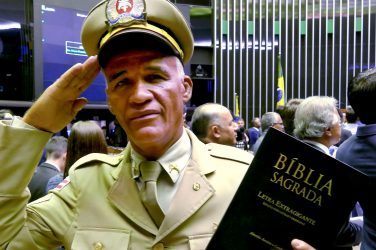“O Processo,” translated from Brazilian Portuguese as “The Trial,” is a new film about the legal process that resulted in the impeachment of former Brazilian President Dilma Rousseff.
Directed by Maria Augusta Ramos, the movie, which blends footage of the actual trial with images of protesters, both for and against Rousseff, was premiered Wednesday at the Berlin Film Festival.
“It says a lot about what’s happening right now… The country remains completely divided,” said Ramos in an interview on Thursday. “When you have a parliamentary coup, it has profound consequences for society as a whole at every level, and this is what we’re seeing now.”
She emphasized that the largest country in South America and the 5th largest in the world must deal with the significant issues it faces. However, Ramos lamented that democracy in Brazil is “sick.”
With Brazil gearing up for general elections in October, Ramos said she “deeply” hopes that the country experiences “really democratic, open elections with all the candidates that people want to vote for and that includes Lula,” in reference to former president Luiz Inácio Lula da Silva.
“History keeps repeating itself,” said Ramos in reference to the part of the film that points out that nine months after Rousseff was ousted as president, Senate-imposed president, Michel Temer, was accused of corruption by the attorney general, according to Reuters.
“It’s impossible when you have a coup d’état, a parliamentary coup … to believe” that such a dramatic rupture “hasn’t affected democracy at all,” she said, expressing hope that her film would allow all Brazilian to relive those events in a less emotional way.
Coup of 2016 Course
Former Brazilian President Dilma Rousseff has railed against an attempt made by Education Minister José Mendonça Bezerra Filho to veto a new political science course offered by the University of Brasília, or UnB, called “The Coup of 2016.”
“To censure a course at UnB, which characterizes the 2016 impeachment process as a coup highlights the… arbitrary nature of this administration led by Senate-imposed president Michel Temer,” Dilma wrote on her official Facebook page.
Filho, for his part, said that he would take legal action to stop the class from taking place.
In response, Dilma wrote that impeding “facts and events” from being called “by their name is a typical reaction by dictatorial regimes. In the past, during the dictatorship, it was prohibited to say that there were political prisoners in Brazil, although prisons throughout the country were filled with them.”
She went on to describe Filho as a “pseudo-minister.”
Taught by Professor Luis Felipe Miguel, “The Coup of 2016” will address three main topics: “To understand the fragile elements of the Brazilian political system, which permitted the democratic rupture of May and August 2016 with the deposition of President Dilma Rousseff; analyze the government headed by Michel Temer and investigate what his agenda of setbacks on rights and restrictions on liberties say about the relationship between social inequalities and the political system in Brazil; and to scrutinize the development of the ongoing crisis and the possibilities of strengthening the popular resistance and the re-establishment of the rule of law and political democracy in Brazil.
Students taking the course will also discuss the infamous Car Wash corruption scandal, as well as the ascension of para-fascism sweeping the country, according to Revista Forum.
teleSUR













